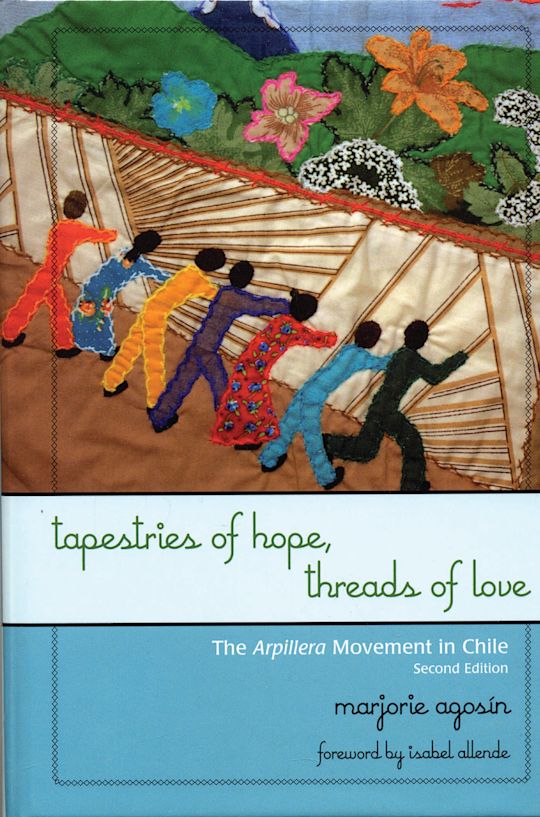- Home
- ACADEMIC
- History
- Latin American History
- Tapestries of Hope, Threads of Love
Tapestries of Hope, Threads of Love
The Arpillera Movement in Chile
- Textbook
Tapestries of Hope, Threads of Love
The Arpillera Movement in Chile
- Textbook
Exam copy added to basket
Choose your preferred format. Please note ebook exam copies are fulfilled by VitalSource™.
Buy from Bloomsbury eTextBooks
You are now leaving the Bloomsbury Publishing website. Your eBook purchase will be with our partner https://www.vitalsource.com.
Your credit card statement will show this purchase originating from VitalSource Technologies. They will also provide any technical assistance you might require.
You must sign in to add this item to your wishlist. Please sign in or create an account
Description
Tapestries of Hope, Threads of Love tells the story of ordinary women living in terror and extreme poverty under General Pinochet's oppressive rule in Chile (1973–1989). These women defied the military dictatorship by embroidering their sorrow on scraps of cloth, using needles and thread as one of the boldest means of popular protest and resistance in Latin America. The arpilleras they made—patchwork tapestries with scenes of everyday life and memorials to their disappeared relatives—were smuggled out of Chile and brought to the world the story of their fruitless searches in jails, morgues, government offices, and the tribunals of law for their husbands, brothers, and sons.
Marjorie Agosín, herself a native of and exile from Chile, has spent more than thirty years interviewing the arpilleristas and following their work. She knows their stories intimately and knows, too, that none of them has ever found a disappeared relative alive. Even though the dictatorship ended in 1989 and democracy returned to Chile, no full account of the detained and disappeared has ever been offered. Still, many women maintain hope and continue to make arpilleras, both in memory and as art.
This new edition of the book, updated for students, includes a reaction to the death of General Pinochet, a chronology of Chile, several new testimonies from arpilleristas in their own words, and an introduction by Peter Kornbluh. It retains a section of full-color plates of arpilleras, an afterword by Peter Winn, and a foreword by Isabel Allende. Students and interested readers will find the arpilleras beautiful, moving, and ultimately hopeful, and the testimonies a powerful way to learn about the history of contemporary Latin America and the arpillera movement in Chile.
Table of Contents
Chronology of Chile, 1941–2006
Introduction
Part I: Art as Witness
Chapter 1: The Texture of Memory
Chapter 2: Returning to the Shadows
Chapter 3: A Journey to the South
Chapter 4: Weaving My Story
Part II: Testimonies, 1973–1994
Chapter 5: Violeta Morales
Chapter 6: Valentina Bonne
Chapter 7: Anita Rojas
Chapter 8: Irma Muller
Chapter 9: Mother of Augustín A. Martínez Meza
Chapter 10: Doris Meniconi Lorca
Chapter 11: Gala Jesús Torres Aravena
Part III: Testimonies, 2005–2006
Chapter 12: Viviana Díaz Caro
Chapter 13: Gala Torres Aravena
Chapter 14: María Madariaga and Patricia Hidalgo
Chapter 15: Charo Henríquez
Chapter 16: Adriana Rojas
Afterword
Epilogue
Product details
| Published | Oct 10 2007 |
|---|---|
| Format | Ebook (Epub & Mobi) |
| Edition | 2nd |
| Extent | 240 |
| ISBN | 9781461666356 |
| Imprint | Rowman & Littlefield |
| Publisher | Bloomsbury Publishing |
About the contributors
Reviews
-
Agosín's poetic touch will engage undergraduate students in the humanities and social sciences as well as general readers.
Hispanic American Historical Review
-
By interweaving bleak storytelling with powerful, colorful depictions of cloth figures standing against a message of 'No a la tortura' or chained together in protest against congressional policy, the complete and tragic story takes on physical and psychological dimensions.
ASG Notions
-
To have these arpilleras reproduced in combination with Marjorie Agosín's compassionate and historical analysis in a new and updated edition is a gift to all those who continue in the struggle for human rights, social justice, and peace. It is also a vital testimonial to women's history, resistance, and culture in Chile and in all of Latin America.
Bettina Aptheker, University of California, Santa Cruz
-
Hope and love, yes, but a fierce and tenacious witness as well, and an insistence on spare truth in the face of brute power: truth armored in a heartrending beauty. With grace and precision, poet Marjorie Agosin sings this suite of Latin American variations on the epics of Penelope's steadfast devotion and Antigone's defiant resolve.
Lawrence Weschler, New York University; author of A Miracle, A Universe: Settling Accounts with Torturers
-
This book should be put in the hands of every student in America, North and South, so all can learn how a culture of fear turned Chile into a well of suffering under Pinochet. Marjorie Agosín's Tapestries of Hope is a shiva made of words, a sacred act of mourning and memory, at once beautiful and heartbreaking. By collecting the stories of the women in Chile who wove their sadness into works of art using the torn clothes of the disappeared, Agosín lets us grieve for those who are lost. At the same time, we join the brave makers of the arpilleras in defying the brutal torturers who attempted to erase the names of their loved ones from history. I thank Marjorie Agosín with all my heart for the gift of this book. It is a gift for all humanity, as great books always are.
Ruth Behar, University of Michigan
-
For twenty years after General Pinochet took power in Chile, a group of arpilleristas protested government brutality by sewing simple and exquisite tapestries in memory of their dead, their tortured, their disappeared loved ones. Almost alone these brave women kept a vigil against the harsh regime by creating an art that is special to their sad and beautiful country. What the arpilleristas speak of in their gentle, agonizing fabrics must never be forgotten—in Chile, and around the globe. This book is a guardian of memory, an important and lonely work of art that radiates social conscience and illuminates the struggle to survive.
John Nichols



































